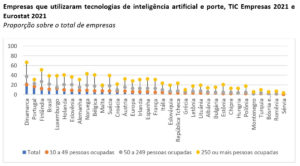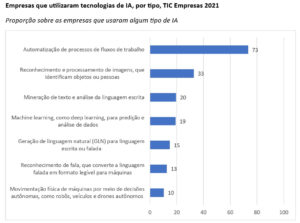 *By Leonardo Melo Lins
*By Leonardo Melo Lins
Current advances within the field of artificial intelligence (AI) point to a broad scenario of applications of these technologies in the daily lives of companies. Discussions around the replacement of people by technology, although they address important points about the future of work, give little information about how much and how AI is present in organizations. Therefore, it is important to understand how much Brazilian companies are prepared to leverage their performance from AI, as well as what already presents itself as current solutions in the market.
An important source of information on the use of technologies in the country's private sector is the ICT Business survey, conducted since 2005 by Cetic.br. The objective of the research is to evaluate the use and adoption of information and communication technologies by Brazilian companies with more than 10 employees. The research uses international references, especially the standard used by the European Statistical Office (Eurostat), allowing comparison of Brazil with some of the main economies in the world.
In its most recent version, the survey brought data on the use of artificial intelligence by companies. According to the results, 13% of Brazilian companies used some type of artificial intelligence technology. In an international comparison, it is possible to see that this use is very concentrated among large companies: in Brazil, 39% of large companies (with more than 250 employed persons) claimed to use some type of AI, a proportion that was 66% in Denmark, a European country of higher proportion of use. It is possible to see that this concentrated use in large companies represents precisely a maturation period for AI in the productive context, given the greater availability of resources in this type of company for experimentation and exploration of new technologies.

The survey also investigated the types of AI companies adopt. In Brazil, among the companies that used some type of AI, the most cited option was the automation of processes and workflows, pointing out by 73% of the organizations interviewed. Aspects more linked to development at the AI frontier, such as machine learning, natural language generation or speech recognition, are much less present in companies. Therefore, the more widespread use of AI among companies seems to be more related to the automation of routine processes, for example, chatbots, indicating much more the purchase of solutions than actually an internal expertise applied to the development of AI. The results of the ICT Companies survey show that the use of AI in Brazilian companies is still incipient, being largely present in auxiliary processes that have no direct relationship with the core business of companies.

In view of recent developments, it is precisely in applications in routine operations that AI advances the most, outlining a scenario of greater speed of dissemination among companies in the coming years. By facilitating the achievement of processes, AI can free up time and resources for the company to seek to improve its core activity, which can lead to added value and productivity gains. Therefore, we observe the beginning of AI as a general purpose technology: if before AI was restricted to academic research, or with few applications in the daily lives of companies, it is now possible to see how the most diverse organizations will be impacted in their routines with the growing presence of AI supporting the most diverse processes.
However, there is still a long way to go. Historian Carl Benedickt Frey, in book “The technology trap”, makes a parallel between the economic and organizational impacts of electricity and the current moment of AI: several changes took place in cities and companies (installation of poles, structural changes in industrial plants) so that there was a complete transition to the use of electricity in the United States, something close to 50 years between Thomas Edison's experiments and the complete electrification of factories, for example. By all indications, it seems that with AI, this time to technology maturation and its deployment is getting shorter and shorter, but data infrastructure and organizational adaptations are still forming for AI to assume a central role in companies.
*Leonardo Melo Lins is an ABES Think Tank Researcher, member of the IEA/USP Postdoctoral Program and Cetic.br Analyst | NIC.br














